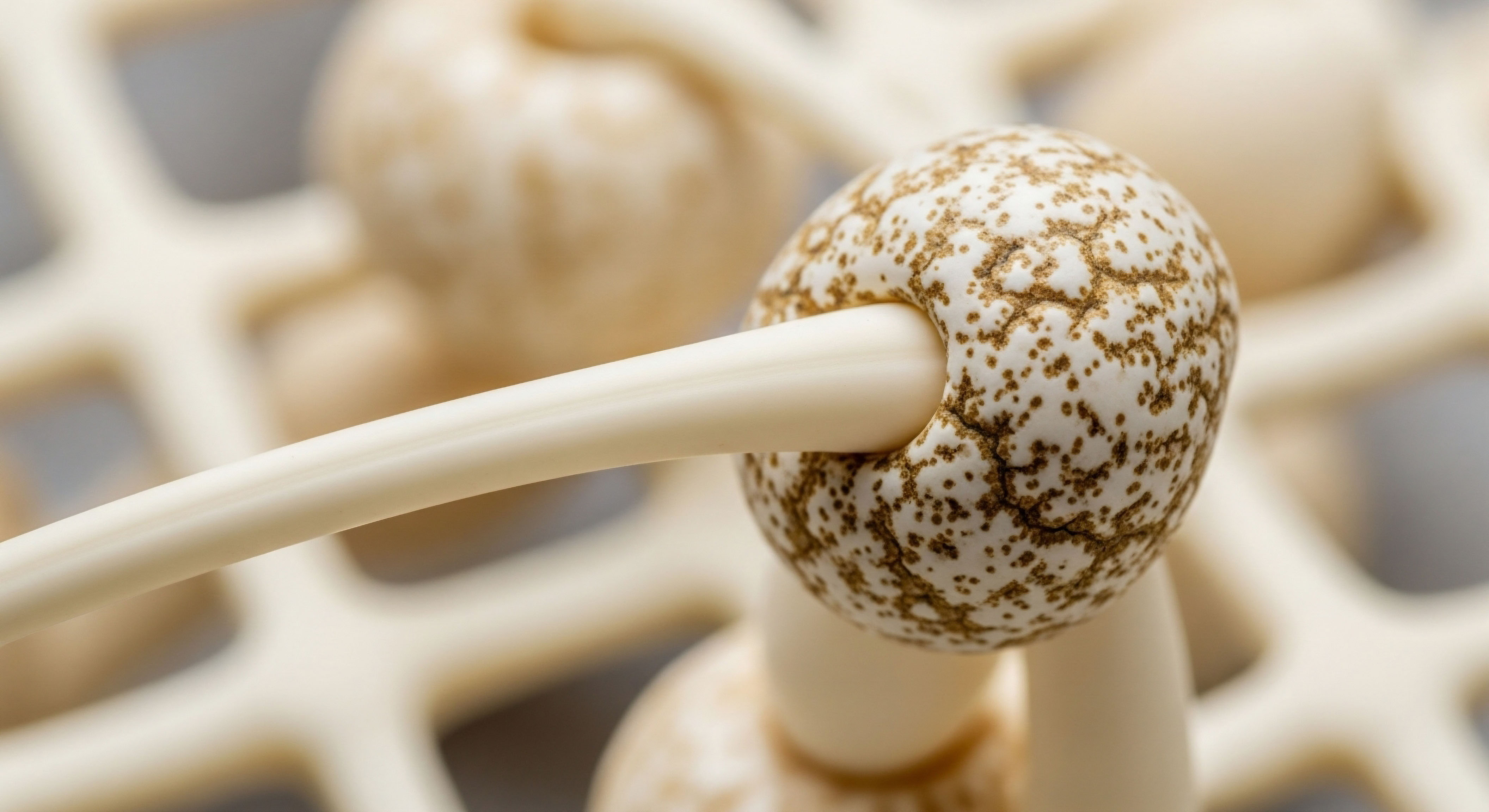

Fundamentals
Many individuals experience a persistent sense of unease, a subtle yet pervasive feeling that their body is not quite functioning as it should. This might manifest as a creeping fatigue that no amount of rest seems to alleviate, a struggle with maintaining a healthy weight despite diligent efforts, or perhaps a disquieting shift in mood and cognitive clarity.
These experiences are not simply isolated occurrences; they often signal a deeper conversation happening within your biological systems, particularly within the intricate network of your endocrine glands. Understanding these internal dialogues is the first step toward reclaiming your vitality and functional well-being.
The human body operates through a sophisticated messaging service, where chemical messengers known as hormones orchestrate nearly every physiological process. These potent compounds are produced by various glands, forming what is collectively known as the endocrine system. This system acts as a grand conductor, ensuring that all bodily functions, from metabolism and growth to mood and reproduction, are precisely synchronized.
When this delicate orchestration falters, even slightly, the repercussions can be felt across multiple systems, leading to the very symptoms that prompt a search for answers.
Among the most influential players in this hormonal symphony are the sex hormones, primarily testosterone, estrogen, and progesterone. While often associated solely with reproductive function, their influence extends far beyond, impacting bone density, cardiovascular health, brain function, and crucially, immune system regulation. These hormones do not operate in isolation; they engage in constant communication with other endocrine glands, including the thyroid gland, which serves as the body’s metabolic regulator.
The thyroid gland, a small, butterfly-shaped organ located at the base of your neck, produces hormones that govern your metabolic rate, influencing how quickly your body converts food into energy. When thyroid function is optimal, you experience steady energy levels, stable mood, and efficient metabolic processes.
However, a significant number of individuals contend with thyroid autoimmunity, a condition where the immune system mistakenly identifies the thyroid gland as a foreign threat and launches an attack against it. The most common manifestation of this is Hashimoto’s thyroiditis, leading to chronic inflammation and, over time, a decline in thyroid hormone production.
Understanding the body’s hormonal messaging system is key to addressing persistent symptoms and reclaiming metabolic balance.
The immune system’s misdirection in thyroid autoimmunity is a complex phenomenon, often influenced by a combination of genetic predispositions and environmental triggers. It is not a simple switch that turns on or off; rather, it is a dynamic process where various internal factors can either exacerbate or mitigate the autoimmune response.
The interconnectedness of the endocrine system means that disruptions in one area, such as sex hormone balance, can have far-reaching consequences, potentially modulating the immune system’s activity and its propensity to target the thyroid gland.
Considering the profound impact of sex hormones on immune function, it becomes clear that their balance plays a significant, though often overlooked, role in the trajectory of thyroid autoimmunity. This understanding moves beyond a simplistic view of isolated symptoms, instead inviting a deeper consideration of how various biological systems interact to shape overall health and vitality. Recognizing this intricate interplay is essential for anyone seeking to address the root causes of their symptoms and restore systemic equilibrium.


Intermediate
Addressing the complex interplay between sex hormones and thyroid autoimmunity requires a thoughtful, individualized approach, often involving targeted clinical protocols designed to restore systemic balance. These protocols are not merely about replacing deficient hormones; they aim to recalibrate the body’s internal messaging, influencing immune function and metabolic health. Understanding the specific agents and their mechanisms of action provides a clearer picture of how these interventions can support overall well-being.
For men experiencing symptoms related to declining testosterone levels, a common protocol involves Testosterone Replacement Therapy (TRT). This typically includes weekly intramuscular injections of Testosterone Cypionate, a synthetic form of testosterone that mimics the body’s natural hormone. The goal extends beyond symptom relief; it seeks to optimize physiological testosterone levels, which can have beneficial effects on energy, mood, muscle mass, and even immune regulation.
To maintain the body’s natural testicular function and preserve fertility during TRT, Gonadorelin is often administered via subcutaneous injections twice weekly. This peptide stimulates the pituitary gland to release luteinizing hormone (LH) and follicle-stimulating hormone (FSH), which are crucial for endogenous testosterone production and sperm development.
Another important component can be Anastrozole, an oral tablet taken twice weekly, which acts as an aromatase inhibitor. This medication helps to block the conversion of testosterone into estrogen, mitigating potential side effects such as gynecomastia or fluid retention, and maintaining a healthy estrogen-to-testosterone ratio. In some cases, Enclomiphene may be included to specifically support LH and FSH levels, further promoting natural testicular activity.
Women also experience significant shifts in hormonal balance, particularly during peri-menopause and post-menopause, which can impact thyroid health. For these individuals, a tailored approach to testosterone optimization is often beneficial. This typically involves Testosterone Cypionate administered weekly via subcutaneous injection, usually in very low doses, such as 10 ∞ 20 units (0.1 ∞ 0.2ml). This precise dosing aims to restore optimal testosterone levels, which can alleviate symptoms like low libido, fatigue, and mood fluctuations, while also supporting bone density and metabolic function.
Targeted hormonal optimization protocols can recalibrate the body’s internal systems, influencing both metabolic and immune health.
The role of Progesterone is particularly significant for women, with its prescription often tailored to menopausal status. Progesterone plays a vital role in balancing estrogen, supporting mood, sleep, and bone health. Its immune-modulating properties are also noteworthy, as it can exert anti-inflammatory effects that may be beneficial in autoimmune conditions. For some women, Pellet Therapy, involving long-acting testosterone pellets inserted subcutaneously, offers a convenient alternative, with Anastrozole considered when appropriate to manage estrogen levels.
Beyond traditional hormone replacement, Growth Hormone Peptide Therapy represents another avenue for systemic support, particularly for active adults and athletes seeking anti-aging benefits, muscle gain, fat loss, and improved sleep quality. Peptides like Sermorelin, Ipamorelin / CJC-1295, Tesamorelin, Hexarelin, and MK-677 work by stimulating the body’s natural production and release of growth hormone. This can indirectly influence metabolic pathways and cellular repair, contributing to overall physiological resilience.
Other targeted peptides offer specific benefits that can complement hormonal optimization strategies. PT-141, for instance, addresses sexual health by acting on melanocortin receptors in the brain, influencing libido and arousal. Pentadeca Arginate (PDA) is recognized for its role in tissue repair, accelerating healing processes, and mitigating inflammation. These peptides, when integrated into a comprehensive wellness protocol, contribute to a more robust and balanced internal environment, which can indirectly support immune regulation and overall systemic health.
The decision to pursue any of these protocols is always a collaborative one, made in consultation with a knowledgeable clinician. It involves a thorough assessment of individual symptoms, comprehensive laboratory testing, and a deep understanding of the body’s unique physiological landscape. The aim is to restore optimal function, not merely to suppress symptoms, thereby empowering individuals to experience a renewed sense of vitality and well-being.
| Protocol Category | Primary Hormone/Peptide | Common Adjunctive Medications | Primary Benefit Focus |
|---|---|---|---|
| Male Testosterone Optimization | Testosterone Cypionate | Gonadorelin, Anastrozole, Enclomiphene | Energy, Mood, Muscle Mass, Fertility Preservation |
| Female Hormone Balance | Testosterone Cypionate, Progesterone | Anastrozole (with pellets) | Libido, Mood, Bone Density, Cycle Regulation |
| Growth Hormone Support | Sermorelin, Ipamorelin / CJC-1295 | None typically | Anti-aging, Muscle Gain, Fat Loss, Sleep Quality |
| Sexual Health Support | PT-141 | None typically | Libido, Arousal |
| Tissue Repair & Anti-Inflammation | Pentadeca Arginate (PDA) | None typically | Healing, Inflammation Reduction |


Academic
The intricate relationship between sex hormones and thyroid autoimmunity represents a compelling area of inquiry, moving beyond simple correlations to explore the deep molecular and immunological mechanisms at play. Understanding this connection requires a systems-biology perspective, recognizing that the endocrine, immune, and metabolic systems are not isolated entities but rather a continuously communicating network.
The predisposition to thyroid autoimmunity, particularly Hashimoto’s thyroiditis, is significantly influenced by hormonal milieu, with estrogens and androgens exerting distinct modulatory effects on immune cell activity and cytokine production.
A central concept in this discussion is the differential impact of estrogen on immune function. Estrogen, particularly 17β-estradiol, is known to be a potent immunomodulator. Its effects are often dose-dependent and receptor-specific, acting through estrogen receptors alpha (ERα) and beta (ERβ) expressed on various immune cells, including T lymphocytes, B lymphocytes, macrophages, and dendritic cells.
Higher estrogen levels, or a state of relative estrogen dominance, are frequently observed in conditions with a female predominance, such as Hashimoto’s thyroiditis. Estrogen can promote a Th1-type immune response, which is characterized by the production of pro-inflammatory cytokines like interferon-gamma (IFN-γ) and tumor necrosis factor-alpha (TNF-α). These cytokines are instrumental in the autoimmune destruction of thyroid tissue.
Conversely, androgens, primarily testosterone, generally exhibit immunosuppressive or anti-inflammatory properties. Testosterone can downregulate the production of pro-inflammatory cytokines and promote a more balanced immune response. In men, lower testosterone levels have been associated with an increased risk of autoimmune conditions, suggesting a protective role for adequate androgen status.
For women, maintaining optimal testosterone levels, even at physiological female ranges, can contribute to a more balanced immune environment, potentially mitigating the pro-inflammatory tendencies associated with estrogen dominance. The precise mechanisms involve testosterone’s influence on regulatory T cells (Tregs) and its ability to suppress B cell activation, both of which are critical in preventing autoimmune attacks.
The role of progesterone in immune modulation is also significant. Progesterone, often considered an anti-inflammatory hormone, can counteract some of the pro-inflammatory effects of estrogen. It promotes a Th2-type immune response, which is generally associated with humoral immunity and can be protective against excessive cellular inflammation.
Progesterone receptors are found on immune cells, and its presence can lead to the production of anti-inflammatory cytokines like IL-10, which helps to dampen autoimmune processes. This balancing act between estrogen and progesterone is crucial for maintaining immune homeostasis, particularly in the context of thyroid autoimmunity.
Sex hormones intricately modulate immune responses, with estrogen often promoting inflammation and testosterone exhibiting anti-inflammatory effects, influencing thyroid autoimmunity.
The interconnectedness extends to the major neuroendocrine axes. The Hypothalamic-Pituitary-Gonadal (HPG) axis, which regulates sex hormone production, communicates extensively with the Hypothalamic-Pituitary-Thyroid (HPT) axis. Chronic stress, for instance, can dysregulate both axes, leading to altered sex hormone profiles and potentially exacerbating thyroid dysfunction. Cortisol, the primary stress hormone, can suppress thyroid hormone conversion and also influence immune cell activity, creating a fertile ground for autoimmune flare-ups.
Furthermore, metabolic health plays a profound role in this hormonal-immune dialogue. Conditions such as insulin resistance and obesity are characterized by chronic low-grade inflammation, which can further sensitize the immune system and contribute to autoimmune processes.
Adipose tissue, beyond being an energy storage site, functions as an active endocrine organ, producing adipokines that influence both sex hormone metabolism and immune function. This creates a vicious cycle where metabolic dysfunction can worsen hormonal imbalances, which in turn can intensify autoimmune activity against the thyroid.

How Do Environmental Factors Influence Hormonal Modulation of Thyroid Autoimmunity?
Environmental factors, including dietary patterns, exposure to toxins, and gut microbiome composition, also interact with sex hormones to influence thyroid autoimmunity. For example, certain dietary components can promote inflammation, which then affects the balance of sex hormones and their impact on immune cells.
Disruptions in the gut microbiome, often termed dysbiosis, can lead to increased intestinal permeability, allowing bacterial products to enter the bloodstream and trigger systemic inflammation, further modulating the immune response and potentially exacerbating thyroid autoimmunity. The liver’s capacity to metabolize and detoxify hormones and environmental compounds is also critical; impaired liver function can lead to an accumulation of certain estrogen metabolites that are more pro-inflammatory, contributing to the autoimmune burden.
The clinical implications of this understanding are substantial. By optimizing sex hormone levels through targeted interventions like Testosterone Replacement Therapy (TRT) for both men and women, and ensuring adequate progesterone levels in women, clinicians aim to create a more favorable immune environment.
This involves not only addressing overt deficiencies but also considering the relative balance of these hormones. For instance, in cases of estrogen dominance, strategies to improve estrogen metabolism or reduce its overall burden may be implemented alongside thyroid support.
The use of specific peptides, such as those that support growth hormone release or tissue repair, can also indirectly contribute to a more resilient physiological state. By enhancing cellular regeneration and reducing systemic inflammation, these peptides can create a less hostile environment for the thyroid gland, potentially slowing the progression of autoimmune damage. This comprehensive approach, which considers the intricate web of hormonal, immune, and metabolic interactions, offers a more holistic pathway to managing thyroid autoimmunity and restoring overall health.
- Immune Cell Modulation ∞ Sex hormones directly influence the activity and differentiation of various immune cells, including T cells, B cells, and natural killer cells, which are central to autoimmune responses.
- Cytokine Production ∞ Estrogen can upregulate pro-inflammatory cytokines, while testosterone and progesterone tend to promote anti-inflammatory cytokine profiles, impacting the autoimmune cascade.
- Hormone Receptor Expression ∞ Immune cells express receptors for sex hormones, allowing direct communication and modulation of immune function based on circulating hormone levels.
- Gut-Immune Axis ∞ Hormonal imbalances can affect gut barrier integrity and microbiome composition, which in turn influences systemic inflammation and autoimmune susceptibility.
| Sex Hormone | Typical Immune Modulation | Relevance to Thyroid Autoimmunity |
|---|---|---|
| Estrogen (High/Dominance) | Pro-inflammatory, Th1 promotion, B cell activation | Associated with higher prevalence and severity of Hashimoto’s, promotes thyroid tissue destruction. |
| Testosterone | Anti-inflammatory, Th2 shift, Treg promotion, B cell suppression | Protective role, lower levels linked to increased autoimmune risk, supports immune balance. |
| Progesterone | Anti-inflammatory, Th2 promotion, IL-10 production | Counteracts estrogen’s pro-inflammatory effects, supports immune tolerance, beneficial in autoimmune conditions. |

References
- Masi, Alfonse T. et al. “Sex hormones and autoimmune disease.” Annals of the New York Academy of Sciences, vol. 1262, no. 1, 2012, pp. 16-27.
- Cutolo, Maurizio, et al. “Sex hormones and the immune system ∞ basic and clinical aspects.” Autoimmunity Reviews, vol. 11, no. 12, 2012, pp. 879-886.
- Lahita, Robert G. “The influence of sex hormones on autoimmune disease.” Clinical and Experimental Rheumatology, vol. 17, no. 3, 1999, pp. 391-398.
- Straub, Rainer H. “The complex role of estrogens in inflammation and autoimmunity.” Endocrine Reviews, vol. 28, no. 5, 2007, pp. 521-574.
- Ngo, Son, et al. “Testosterone and the male immune system.” Journal of Andrology, vol. 30, no. 4, 2009, pp. 387-397.
- Hughes, George C. and Robert G. Lahita. “Sex hormones and autoimmune disease.” Current Opinion in Rheumatology, vol. 15, no. 5, 2003, pp. 556-560.
- Chrousos, George P. “Stress and disorders of the stress system.” Nature Reviews Endocrinology, vol. 5, no. 7, 2009, pp. 374-381.
- Fantuzzi, Giamila. “Adipose tissue, adipokines, and inflammation.” Journal of Allergy and Clinical Immunology, vol. 113, no. 1, 2004, pp. 11-20.
- Kresser, Chris. Unconventional Medicine ∞ Join the Revolution to Transform Healthcare from the Inside Out. Chelsea Green Publishing, 2017.
- Romm, Aviva. Botanical Medicine for Women’s Health. Elsevier Health Sciences, 2010.

Reflection
The journey toward understanding your own biological systems is a deeply personal one, a continuous process of discovery and recalibration. The insights shared here, particularly concerning the intricate dance between sex hormones and thyroid autoimmunity, are not merely academic points; they are guideposts for your own health narrative. Recognizing that your symptoms are often signals from an interconnected system, rather than isolated malfunctions, transforms the path forward.
This knowledge serves as a powerful foundation, inviting you to consider your health from a more integrated perspective. It prompts introspection ∞ How might your own hormonal balance be influencing your overall vitality? What subtle shifts in your body’s messaging might be contributing to your current experience? The answers lie not in a one-size-fits-all solution, but in a personalized exploration, guided by clinical expertise and a commitment to understanding your unique physiology.
Your body possesses an inherent capacity for balance and resilience. By approaching your health with curiosity and a willingness to understand its underlying mechanisms, you begin to reclaim agency over your well-being. This is not a destination, but an ongoing dialogue with your own biology, leading to a more vibrant and functionally optimized life.



